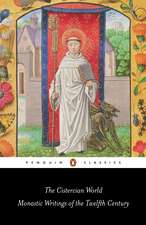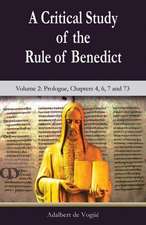Enlightened Monks: The German Benedictines 1740-1803
Autor Ulrich L. Lehneren Limba Engleză Paperback – 15 mai 2013
| Toate formatele și edițiile | Preț | Express |
|---|---|---|
| Paperback (1) | 333.25 lei 31-37 zile | |
| OUP OXFORD – 15 mai 2013 | 333.25 lei 31-37 zile | |
| Hardback (1) | 774.62 lei 31-37 zile | |
| OUP OXFORD – 24 mar 2011 | 774.62 lei 31-37 zile |
Preț: 333.25 lei
Preț vechi: 409.20 lei
-19% Nou
Puncte Express: 500
Preț estimativ în valută:
63.78€ • 66.34$ • 52.65£
63.78€ • 66.34$ • 52.65£
Carte tipărită la comandă
Livrare economică 03-09 aprilie
Preluare comenzi: 021 569.72.76
Specificații
ISBN-13: 9780199682355
ISBN-10: 0199682356
Pagini: 288
Ilustrații: 1 map
Dimensiuni: 155 x 234 x 16 mm
Greutate: 0.43 kg
Editura: OUP OXFORD
Colecția OUP Oxford
Locul publicării:Oxford, United Kingdom
ISBN-10: 0199682356
Pagini: 288
Ilustrații: 1 map
Dimensiuni: 155 x 234 x 16 mm
Greutate: 0.43 kg
Editura: OUP OXFORD
Colecția OUP Oxford
Locul publicării:Oxford, United Kingdom
Recenzii
Review from previous edition The book demonstrates in surprising new ways how eighteenth-century Benedictines of the Catholic Enlightenment engaged with all branches of contemporary academic study while simultaneously accommodating the monastic life to modernizing trends in European society. Engagingly written, deeply researched, and seriously engaged with current research, Lehner's work demonstrates that the Enlightenment was far more than a secular movement pitted against an obscurantist religious outlook. It was, rather, a multi-faceted trend to reconcile science and reason with matters of faith. Enlightened Monks illustrates how, paradoxically, an institution known most as a relic of the medieval past actually stood on the front lines of this endeavor.
Lehner's work marks a significant step in original research. His extensive citation of archival sources offers a new perspective on European religious culture...The book's content appeals to a wide range of scholars and is not reserved for the narrow musings of the specialist. The sociologist and historian will be intrigued as will the philosopher and the theologian.
Academics will appreciate its meticulously documented research, as well as the wealth of German scholarship Lehner makes available to his English readers.
a valuable and carefully researched study ... an important and extremely welcome addition to the literature on the Benedictine order and the Catholic religious Enlightenment more generally.
This very learned and highly original book, based on little-known and often obscure sources, reveals the existence of a remarkable subculture of Enlightened, even revolutionary, monks who had personal as well as literary and philosophical connections with the non-monastic world.
considers how the Enlightenment influenced the social and intellectual lives of Benedictine monks in German-speaking Europe ... Lehner has proffered a convincing argument that the German Benedictines might be counted not only as constituents of the Catholic Aufklärung, but as figures who existed squarely within the Enlightenment itself.
Lehner argues persuavively that many of the German Benedictines integrated the oldest of the Enlightenment in their own system of thought... a scholarly work which should be in all major libraries.
Lehner offers, among other things, an excellent description of monastic prisons, as well as deftly drawn portraits of various savants, rogues, and dreamers in and out of the monasteries. ^
Lehner is nothing if not a thorough and industrious scholar, and the wealth of information he has amassed alone makes this book a valuable resource. But he is also a fluid writer, with an eye for piquant details and arresting stories, ensuring that the narrative is enlivened along the way by a great number of vivid and sensitive portraits of individuals.
This fascinating book...might stimulate monastic communities today to ask whether they too could learn from the Enlightened Monks.
This book is highly entertaining.
A stimulating book that will leave no one indifferent!
Many of the ideas and reforms of these eighteenth century Benedictines are in many ways strikingly similar to the radical changes in monasticism after the Second Vatican Council...It is the great merit of this book to have saved these enlightened Benedictines from oblivion and to have unearthed a monastic culture that was characterized by its openness to modernity.
Beautifully written and cogently argued, Lehners book makes a thoroughly convincing case for what those clinging to a Voltairean Enlightenment will hardly believe - enlightened monks.
Lehner's work is exquisitely researched and an absolute delight to read if only for its hilarity, which is disarmingly refreshing in scholarly works. This book is perfect for graduate students specializing in either history or the history of theology. Very advanced theology or history undergraduates would also find this to be instructive for continuing on to pursue graduate research. As a primer on research methods alone this work is exemplary, a true guidebook for common and specialized citation methods...As a model of contemporary historiography and engaging scholarship, Enlightened Monks is about as good as it gets.
This book is of the same calibre as Derek Beale's magisterial work about monasticism during the Ancien Régime.
Lehner's book offers an excellent social, cultural and intellectual history of the German Benedictines...a sophisticated structure and sound balance between the presentation of case studies and general trends that are all supported by the comprehensive study of archival sources.
Lehner's work marks a significant step in original research. His extensive citation of archival sources offers a new perspective on European religious culture...The book's content appeals to a wide range of scholars and is not reserved for the narrow musings of the specialist. The sociologist and historian will be intrigued as will the philosopher and the theologian.
Academics will appreciate its meticulously documented research, as well as the wealth of German scholarship Lehner makes available to his English readers.
a valuable and carefully researched study ... an important and extremely welcome addition to the literature on the Benedictine order and the Catholic religious Enlightenment more generally.
This very learned and highly original book, based on little-known and often obscure sources, reveals the existence of a remarkable subculture of Enlightened, even revolutionary, monks who had personal as well as literary and philosophical connections with the non-monastic world.
considers how the Enlightenment influenced the social and intellectual lives of Benedictine monks in German-speaking Europe ... Lehner has proffered a convincing argument that the German Benedictines might be counted not only as constituents of the Catholic Aufklärung, but as figures who existed squarely within the Enlightenment itself.
Lehner argues persuavively that many of the German Benedictines integrated the oldest of the Enlightenment in their own system of thought... a scholarly work which should be in all major libraries.
Lehner offers, among other things, an excellent description of monastic prisons, as well as deftly drawn portraits of various savants, rogues, and dreamers in and out of the monasteries. ^
Lehner is nothing if not a thorough and industrious scholar, and the wealth of information he has amassed alone makes this book a valuable resource. But he is also a fluid writer, with an eye for piquant details and arresting stories, ensuring that the narrative is enlivened along the way by a great number of vivid and sensitive portraits of individuals.
This fascinating book...might stimulate monastic communities today to ask whether they too could learn from the Enlightened Monks.
This book is highly entertaining.
A stimulating book that will leave no one indifferent!
Many of the ideas and reforms of these eighteenth century Benedictines are in many ways strikingly similar to the radical changes in monasticism after the Second Vatican Council...It is the great merit of this book to have saved these enlightened Benedictines from oblivion and to have unearthed a monastic culture that was characterized by its openness to modernity.
Beautifully written and cogently argued, Lehners book makes a thoroughly convincing case for what those clinging to a Voltairean Enlightenment will hardly believe - enlightened monks.
Lehner's work is exquisitely researched and an absolute delight to read if only for its hilarity, which is disarmingly refreshing in scholarly works. This book is perfect for graduate students specializing in either history or the history of theology. Very advanced theology or history undergraduates would also find this to be instructive for continuing on to pursue graduate research. As a primer on research methods alone this work is exemplary, a true guidebook for common and specialized citation methods...As a model of contemporary historiography and engaging scholarship, Enlightened Monks is about as good as it gets.
This book is of the same calibre as Derek Beale's magisterial work about monasticism during the Ancien Régime.
Lehner's book offers an excellent social, cultural and intellectual history of the German Benedictines...a sophisticated structure and sound balance between the presentation of case studies and general trends that are all supported by the comprehensive study of archival sources.
Notă biografică
Ulrich L. Lehner is William K. Warren Professor of Theology at University of Notre Dame, Indiana. A member of the European Academy of Sciences and Arts, he has received awards and fellowships from the Princeton Institute for Advanced Study, the Notre Dame Institute of Advanced Study, the Earhart Foundation, the German Humboldt Foundation and the Carl Friedrich von Siemens Foundation. He is the award-winning author of several scholarly works on early modern and modern history of religion.











